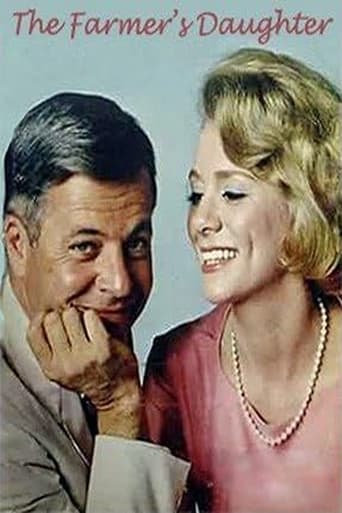bkoganbing
Although Loretta Young won her Academy Award playing The Farmer's Daughter she did have to fake an accent for the role of Katy Holstrum. When doing the television series, the producer's had the good sense to hire a natural blond and a natural Swede.Both came in the person of the lovely and tragic Inger Stevens who was governess to the sons of Congressman William Windom from, where else, Minnesota. Windom's political opinions were kept carefully discreet in the series so we don't know if he was a Republican in the Harold Stassen mode or a follower of Hubert Humphrey's Democrat-Farmer Labor party. Either way he was a good guy which was a switch for him because until he played Dr. Hazlett on Murder She Wrote, he was a villain on the big screen a lot. Congressman Glen Morley on the big screen had been done by Joseph Cotten.The character of the gruff and kindly butler that Charles Bickford did so well was completely dropped. But Ethel Barrymore's role as a Senatorial widow and mother to Joseph Cotten was taken over by Cathleen Nesbitt. She was a grand and imperious lady who had all kinds of good advice, political and personal.Stevens made herself indispensable to William Windom and it was inevitable that like in the movie they would marry. Of course that did signal the end of the series after a good run. The Farmer's Daughter was as big a success on the small screen as on the big.
cotterrealestate
The Farmers Daughter is such a unique and rare 60s gem that I've always been disappointed that it has been mostly forgotten. Maybe it was the tragic death of it's gorgeous star that tainted it's value in syndication so a subsequent audience was never allowed an opportunity to "rediscover" the show in reruns.It was loosely based on "The Farmer's Daughter" a '40s movie starring Loretta Young and Joseph Cotten. In this TV version, Katy Holstrum, the main character, is a Swedish-American farm girl, with simple, gracious common-sense and a patriotic determination to make a difference in the world. She visits her congressman in Washington in hopes of securing a Peace Corps-esquire appointment educating children in the Congo.Instead, Congressman Glenn Morely, a widower, observes first-hand that Katy is exceptional with children (his) and offers her a job as "temporary" governess awaiting her assignment to the Congo. However, Katy falls in love with the two boys and the Congressman's mother (who has been acting as "First Lady" for her son) and ends up staying indefinitely.Of course, because Katy is a very intelligent woman with progressive, feminist views, she and the Congressman are often in conflict on a variety of issues. Indeed, almost immediately, there is romantic tension between the lovely Governess and handsome politician which is also the basis for many story lines.In general, the show is an excellent reflection of a un-traditional family life in the 50s 60s, much like its contemporary "My Three Sons" and its successors "Family Affair" and "The Real McCoys." The glamorous portrayal Washington is timely as John F. Kennedy and is Camelot administration was in full glory. Inger Stevens, is very charismatic in her starring role and is just a joy to watch, even if you don't appreciate the show on it's own merits.It's very interesting to see a very young William Windom, after being more acquainted with his well-respected character work of later years.Interestingly, in the 90s, THE NANNY appears to have been greatly influenced by The Farmer's Daughter's premise and plots--with the exception of the title characters being absolute opposites!
zachsandman
"Ja, Ja!" Being a native Washingtonian, I truly appreciate the historical footage depicted in "The Farmer's Daughter". When this show aired on ABC in 1963 I was only 3 years old. However, by the time it ended in 1966 I was aware of it, mainly because of its star, Inger Stevens. "The Farmer's Daughter" was unlike any other TV show that aired before it. I'm not aware of any other show before it in which an employee and her boss were in love with one another. In almost every episode, Katy and Congressman Morley were jealous of the opposition. For example, in my favorite episode (#21), "The Playboy of Capitol Hill", Peter Graves played the playboy who falls in love with Katy. This, of course, makes Congressman Morley jealous. This is what made this show and other shows special during the early years of television. There was a level of innocence that has been forever lost. Katy and the Congressman finally married in November of 1965 but the final episode aired in April of 1966.. Inger Stevens was never more glamorous than she was in the role of Katy Holstrum. She was like a Swedish version of June Cleaver. However, she was single and somewhat of a feminist for that era. The writers and producers clearly had Inger Stevens in mind when they created the show. I suspect that they allowed her to be herself because the show seemed almost biographical in nature. Unfortunately, Stevens real life didn't have a happy ending. She committed suicide in April 1970. During the 1980's, the Christian Broadcasting Network (CBN) aired the series in it's entirety. Thankfully, because of CBN I have in my collection the entire series. In 2000, "The Farmer's Daughter Remembered" by William Patterson was published. A. Zachary Sanders


